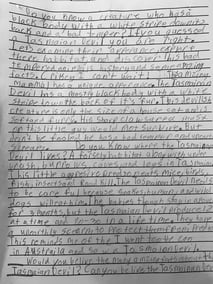Recommended Reading | Empowering Writers with Dyslexia
10 Tips for Teaching Writing to Your Dyslexic Students
Read Time 4 mins | Mar 26, 2020 12:03:49 AM | Written by: Toolbox
You would think that someone who struggled to learn how to read, would struggle even more to learn how to write, right? But, as a person with dyslexia, I have to say, I found learning how to write much easier than learning how to read. This is probably because writing requires some skills, like vocabulary and general knowledge, that are unaffected by dyslexia. (Even when I was reading on a below first grade level at the end of third grade, my vocabulary tested at grade 9+ and my fund of general knowledge tested way above grade level too.)
This is not to say that learning how to write was easy. It wasn’t, but here are some tips that helped me and will probably help most dyslexic students:
1. Use pictures. Most people with dyslexia minds are highly visual. Pictures will help us describe something in words and add details.
2. Expect inconsistency. Probably the most frustrating thing about being dyslexic is that one day you feel like you’re making good progress and keeping up with the rest of the class, but the next day, nothing makes sense and you are baffled by stuff that you understood yesterday. This happened to me all the time, especially in elementary school. Please don’t tell me I am not trying my best today because I was able to do better yesterday. It’s not true and it’s very discouraging.
Click to read about the Before and After student sample
from this student with dyslexia
3. Be flexible about topics. My favorite way to learn is to research and write about a topic that fascinates me, but writing about a topic of no interest to me is pure drudgery. Please give me as much freedom as possible to choose my own topic.
4. Don’t let the aide hover over me. One of the things I hated most about school was when an aide told me what to do every step of the way. I’d rather do it my way and be wrong than just do exactly what somebody else says, especially with my writing. One aide told me that I had to use sentence starters, which I know are helpful to a lot of students, but always made me feel like I was taking an easy way out, almost cheating even.
5. Give me specific feedback. My favorite teacher used to make checkmarks in light pencil beside sentences that I needed to revise and then talk to me about how to do so. She’d also make stars in places where I needed to add more information. I was always able to improve my writing this way.
6. Let me use audiobooks and videos when doing research. Researching from books alone gets tedious, especially for people with dyslexia who usually read at a slow pace. I’ll get more writing done if you let me gather information from audiobooks and videos as well as printed sources.
7. Use consistent vocabulary. Is there a difference between a topic sentence and a thesis statement? I think so, but I’m still not sure. I had a teacher who used the terms interchangeably which confused and frustrated me.
For more information on teaching writing to students with dyslexia and activities to use in the classroom click here.
8. Always, always, always allow me to use the keyboard. SpellCheck is really, really important to me. (And if a spelling mistake gets past SpellCheck, please don’t count it against me.)
9. Don’t just correct my punctuation but review the rules of punctuation with me. If I ever learn how to use punctuation marks correctly it’s going to be the result of extensive review. I know this is boring for teachers. It’s boring for me too but it’s the only way.
10. Please don’t confuse inattention with lack of interest. I take pride in my work, but I do have trouble staying focused for long periods of time. Remember: a dyslexic brain makes 5X more neural connections than a nondyslexic brain when engaged in language-based tasks. This is a fact that’s been proven over and over again by scientific research. So, of course, those hard-working brains get tired 5X faster and need to take breaks 5X as often.
I hope what I’ve written here helps you teach the dyslexic kids in your class. Please don’t lower your expectations for us. Just respect us, and give us the time and help we need. It might take a long time and it’ll definitely take a lot of effort, but we are capable of becoming great writers.
If you’d like to learn more about dyslexia, there’s tons of great information at the website for the Yale Center for Dyslexia and Creativity. Just check out dyslexia.yale.edu

